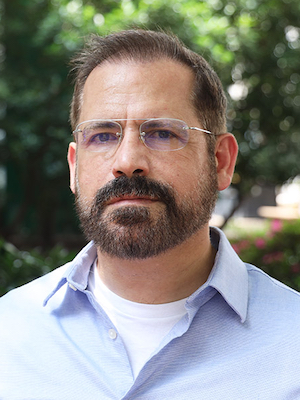Emmanuel Skordalakes, Ph.D.
Associate Professor

Department: Pharmacology and Toxicology
Email: Emmanuel.Skordalakes@vcuhealth.org
Address/Location:
Massey Cancer Center
401 College Street,
Goodwin Research Laboratories, Room 163,
Richmond, Virginia, 23298-0035
Education
- Anglia Ruskin University, Cambridge, UK, B.Sc., 1990
- University College London, London, UK, M.Sc., 1992
- Imperial College and Medical Research Council, London, UK, Ph.D., 2000
- University of California, Berkeley, Post-Doc, 2006
Research interests
- Telomere Biology and cancer therapeutics
My research focuses on protein nucleic acid assemblies that participate in the replication and maintenance of eukaryotic chromosome ends, called telomeres. Telomeres protect chromosome ends from gradual erosion, prevent end-to-end fusions, and promote proper chromosome partitioning during meiosis. Telomere length deregulation and telomerase reactivation are necessary steps in cancer cell proliferation. Furthermore, telomerase and telomere dysfunction contribute to replicative senescence and programmed cell aging. The lab's long-term goal is to understand how telomeric complexes protect chromosome ends and mediate their replication. Since telomeres and their associated proteins are linked with many human pathologies and aging, understanding these processes will help us design useful therapeutic approaches against cancer and age-related diseases.
Telomerase function
Telomere replication is mediated by telomerase, an RNA-dependent reverse transcriptase. Our goal is to further elucidate the molecular basis of telomere replication by telomerase using biophysical, biochemical, and cell-based approaches. The information generated here should provide novel insights into the basic mechanisms of telomere replication and length homeostasis. It will further enrich our understanding of DNA replication mechanisms by polymerases in general. It will provide a framework to design small molecule modulators of telomerase activity with potential therapeutic value for cancer and other diseases associated with cellular aging.
Telomerase regulation
In recent years, several proteins essential for telomerase regulation and telomere maintenance have been identified. The method by which telomerase and associated regulatory factors physically interact and function with each other to maintain appropriate telomere length is poorly understood. Structural and biochemical characterization of these factors, both in isolation and in complex with one another will facilitate our understanding of how the proper function of these factors impacts telomerase function and cell proliferation.
Development of novel cancer therapeutics
It is well established that approximately 85% of human cancers induce telomerase reactivation to maintain dysregulated cell proliferation, whereas 15% use ALT, a recombination mechanism. Our goal is to identify novel small-molecule inhibitors of telomerase and its regulatory proteins. The inhibitors will be used either alone or in combination with ALT inhibitors to treat melanoma, breast, prostate, and lung cancer.
External Research summaries:
Selected publications:
a) Telomere dysfunction implicates POT1 in patients with idiopathic pulmonary fibrosis. Joseph Kelich, Tomas Aramburu,….., Coline H.M. van Moorsel, Emmanuel Skordalakes. J Exp Med2 May 2022; 219 (5): e20211681. PMID: 35420632
b) Rice C, Shastrula PK, Kossenkov AV, Hills R, Baird DM, Showe LC, Doukov T, Janicki S, Skordalakes E. Structural and functional analysis of the human POT1-TPP1 telomeric complex. Nat Commun. 2017 Apr 10;8:14928. doi: 10.1038/ncomms14928. PMID: 28393830.
c) Mitchell M, Gillis A, Futahashi M, Fujiwara H, Skordalakes E. Structural basis for telomerase catalytic subunit TERT binding to RNA template and telomeric DNA. Nat Struct Mol Biol. 17: 513-518, 2010. PMID: 20357774